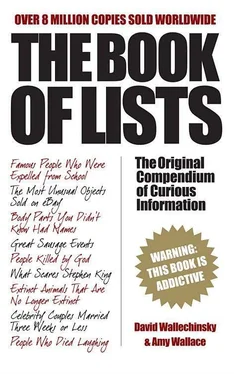A US district attorney prosecuting inventor Lee De Forest for selling stock fraudulently through the US mails for his Radio Telephone Company, 1913
The first transatlantic broadcast of a human voice occurred on December 31, 1923, from Pittsburgh, Pennsylvania, to Manchester, England.
5. BOLSHEVISM
‘What are the Bolsheviki? They are representatives of the most democratic government in Europe… Let us recognise the truest democracy in Europe, the truest democracy in the world today.’
William Randolph Hearst, US newspaper publisher, 1918
6. ROCKET RESEARCH
‘That Professor Goddard and his “chair” in Clark College and the countenancing of the Smithsonian Institution does not know the relation of action to reaction, and of the need to have something better than a vacuum against which to react — to say that would be absurd. Of course he only seems to lack the knowledge ladled out daily in high schools.’
The New York Times , January 12, 1920
The New York Times printed a formal retraction of this comment some forty-nine years later, on July 17, 1969, just prior to the Apollo landing on the moon.
‘The proposals as outlined in your letter… have been carefully reviewed… While the Air Corps is deeply interested in the research work being carried out by your organization… it does not, at this time, feel justified in obligating further funds for basic jet propulsion research and experimentation.’
Brigadier General George H. Brett, US Army Air Corps, in a letter to rocket researcher Robert Goddard, 1941
7. AIR STRIKES ON NAVAL VESSELS
‘The day of the battleship has not passed, and it is highly unlikely that an airplane, or fleet of them, could ever successfully sink a fleet of navy vessels under battle conditions.’
Franklin D. Roosevelt, US Assistant Secretary of the Navy, 1922
‘As far as sinking a ship with a bomb is concerned, you just can’t do it.’
Rear Admiral Clark Woodward, US Navy, 1939
8. JAPAN AND THE UNITED STATES
‘Nobody now fears that a Japanese fleet could deal an unexpected blow on our Pacific possessions… Radio makes surprise impossible.’
Josephus Daniels, former US Secretary of the Navy, October 16, 1922
‘A Japanese attack on Pearl Harbor is a strategic impossibility.’
George Fielding Eliot, ‘The Impossible War with Japan’,
American Mercury , September 1938
See newspaper headlines for December 7, 1941.
9. COMMERCIAL TELEVISION
‘While theoretically and technically television may be feasible, commercially and financially I consider it an impossibility, a development of which we need waste little time dreaming.’
Lee De Forest, US inventor and ‘father of the radio’, 1926
‘[Television] won’t be able to hold onto any market it captures after the first six months. People will soon get tired of staring at a plywood box every night.’
Darryl F. Zanuck
10. REPEAL OF PROHIBITION
‘I will never see the day when the Eighteenth Amendment is out of the Constitution of the United States.’
William Borah, US senator, 1929
The Eighteenth Amendment was repealed in 1933. Borah was alive to see the day. He did not die until 1940.
11. HITLER
‘In this column for years, I have constantly laboured these points: Hitler’s horoscope is not a war-horoscope… If and when war comes, not he but others will strike the first blow.’
R.H. Naylor, British astrologer for the
London Sunday Express, 1939
12. THE ATOMIC BOMB
‘That is the biggest fool thing we have ever done… The bomb will never go off, and I speak as an expert in explosives.’
Admiral William Leahy, US Navy officer speaking to President Truman, 1945
13. LANDING ON THE MOON
‘Landing and moving around the moon offers so many serious problems for human beings that it may take science another 200 years to lick them.’
Science Digest , August 1948.
It took 21 years.
14. ATOMIC FUEL
‘It can be taken for granted that before 1980 ships, aircraft, locomotives, and even automobiles will be atomically fuelled.’
David Sarnoff, US radio executive and former head of
RCA , 1955
15. THE VIETNAM WAR
‘The war in Vietnam is going well and will succeed.’
Robert McNamara, US Secretary of Defence, January 31, 1963
‘We are not about to send American boys 9,000 or 10,000 miles away from home to do what Asian boys ought to be doing for themselves.’
Lyndon B. Johnson, US president, October 21, 1964
‘Whatever happens in Vietnam, I can conceive of nothing except military victory.’
Lyndon B. Johnson, in a speech at West Point, 1967
16. FASHION IN THE 1970s
‘So women will wear pants and men will wear skirts interchangeably. And since there won’t be any squeamishness about nudity, see-through clothes will only be see-through for reasons of comfort. Weather permitting, both sexes will go about bare-chested, though women will wear simple protective panties.’
Rudi Gernreich, US fashion designer, 1970
17. THE FALL OF THE BERLIN WALL
‘Liberalisation is a ploy… the Wall will remain.’
George Will, columnist for
The Washington Post , November 9, 1989
— the day the Berlin Wall fell.
18. COLLAPSE OF THE SOVIET UNION
‘We must expect the Soviet system to survive in its present brutish form for a very long time. There will be Soviet labour camps and Soviet torture chambers well into our great-grand-children’s lives.’
Newt Gingrich, US Representative (and future Speaker of the House), 1984
19. INVASION OF IRAQ #1
‘There is a minimal risk of conflict.’
Heino Kopietz, senior Middle East analyst, on the possibility of Iraq invading Kuwait, in
The Times of London, July 26, 1990
Iraq invaded Kuwait five days later.
20. 9/11
‘Who cares about a little terrorist in Afghanistan?’
Paul Wolfowitz, US Deputy Secretary of Defense, dismissing concerns about al-Qaeda at an April 2001 meeting on terrorism
21. INVASION OF IRAQ #2
‘I have no doubt we’re going to find big stores of weapons of mass destruction.’
Kenneth Adelman, Defense Policy Board member, in
The Washington Post , March 23, 2003
‘[The war] could last six days, six weeks. I doubt six months.’
Donald Rumsfeld, US Secretary of Defense, to US troops in Aviano, Italy, February 7, 2003
‘[My] belief is we will, in fact, be greeted as liberators… I think it will go relatively quickly, weeks rather than months.’
Dick Cheney, US Vice President, March 16, 2003
‘We are dealing with a country that can really finance its own reconstruction and relatively soon.’
Paul Wolfowitz, US Deputy Secretary of Defense, to the House Budget Committee, February 27, 2003 – K.H.J. & C.F.
10 FUNGUSES THAT CHANGED HISTORY
1. THE YELLOW PLAGUE ( Aspergillus flavus )
A. flavus is an innocent-looking but deadly yellowish mould also called aflatoxin. Undoubtedly the cause of countless deaths throughout history, it was not suspected of being poisonous until 1960. That year, a mysterious disease killed 100,000 young turkeys in England and medical researchers traced the ‘turkey-X disease’ to A. flavus growing on the birds’ peanut meal feed. Hardy, widespread and lethal, aflatoxin is a powerful liver cancer agent. Even so, people have long cultivated A. flavus — in small amounts — as part of the manufacturing process of soy sauce and sake. But A. flavus can get out of control easily. It thrives on warm, damp conditions and as it breeds — sometimes to lethal proportions within 24 hours — the mould produces its own heat, which spurs even faster growth. Some of A. flavus ’ favourite dishes are stored peanuts, rice, corn, wheat, potatoes, peas, cocoa, cured hams and sausage.
Читать дальше












